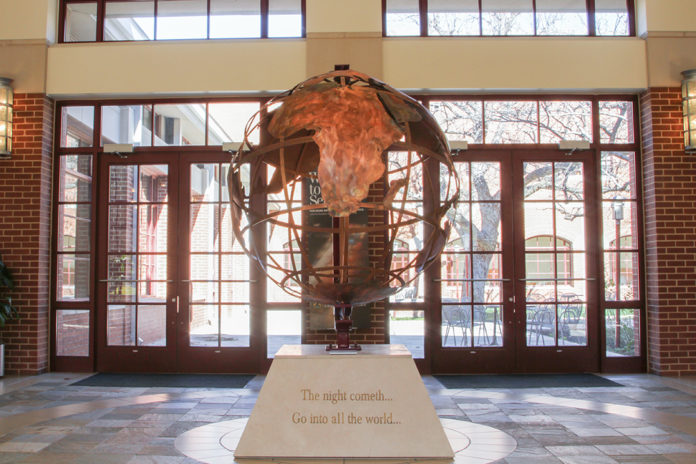
Baylor University has been able to provide tremendous resources for students to seek guidance, comfort and fellowship throughout a year like this one. One of the most accessible resources all students have is pastoral care.
The meaning and purpose of pastoral care, according to the Spiritual Life department, is to provide students with a ministry of compassion and guidance offered by someone trained in matters of faith and the soul. Students, staff and faculty can benefit by speaking with a minister from time to time, given the many challenges faced in a university setting.
Kristen Richardson, director of pastoral care at Baylor, described the process students take when beginning to engage with members of the pastoral care team and how conversations are initiated.
“A lot of care provided this past year has been virtual,” Richardson said. “This has been helpful when students have not physically been in Waco because we’ve been able to provide care for them in ways that would not have been able to before COVID.”
Students dealing with struggles surrounding college life are not the only people that the Department of Pastoral Care aims to connect with. Richardson said she encourages students to reach out to people in the Bobo Spiritual Life Center or the counseling center, even if they might not feel they have a valid reason to.
“Going to talk to someone on campus who understands, regardless of if a student is in crisis [or wants to] figure out what their calling is and their purpose is, is so important. You don’t have to be in a major crisis to come talk to someone,” Richardson said. “It can also be helpful to talk to someone now so that when you do have a crisis moment, you already have someone right there on campus to help you.”
Irving junior Truett Seminary student Adam Jones said he has experienced this and engaging in intentional conversations can prove beneficial for anyone.
“Everyone needs someone who can show them unconditional love. Pastors and ministers aren’t always perfect at this, but they can point others towards a perfect God,” Jones said. “In times of need, apathy and celebration, being around someone who is there for you is so important.”
Jones said college students can feel isolated, like they can’t share those feelings with others. Though he said actually it can be refreshing; being able to meet with someone who cares for them in a pastoral way and is willing to share God’s love.
The isolation that many students may feel provides the Department of Pastoral Care with the unique opportunity to meet students where they are most comfortable.
“People who may have not been willing to go to a counselor’s office or a pastor’s office may find it easier to engage virtually,” Jones said. “I think it also connects people around the world and allows people to be met where they are at. With virtual meetings, people can realize that God is present through distanced contact.”
Although virtual contact has and will continue to be an option for students this year, Richardson said she encourages on-campus residents to continue utilizing their Resident Chaplains as a form of contact.
“This past year, since students have not been walking into the Bobo as much as they might have in years past, our referrals are primarily through email or phone calls,” Richardson said. “Caring for students who are quarantined and isolated has been one of the many ways that resident chaplains have cared for students this year.”
Kendall Ellis, resident chaplain at Collins Residence Hall, said she has been communicating closely with residents in quarantine and isolation as well as building community with students throughout the year.
“I check in every few days with residents in quarantine and isolation. At first, I didn’t find it very pastoral, but honestly, it has been a really cool thing and a huge aspect of pastoral care,” Ellis said. “These are people that I otherwise wouldn’t have gotten to meet and I get to have lighthearted and more deep conversations with them.”
Resident chaplains are able to provide a unique approach to pastoral care that continues to engage students.
“Part of providing pastoral care in the hall is being able to have interactive programs and having fun and meeting people,” Ellis said. “Because I have those touch points, it sets a foundation for people to know they can come to me during possible future situations or crises.”
More one-on-one conversations due to COVID-19 is an unexpected blessing that has benefitted her work, Ellis said.
“I have been able to have more one-on-one interactions that are more informal and direct,” she said. “That is the fun thing about pastoral care. The pendulum of conversation topics can swing and be so different. Meeting people where they are at takes off the pressure.”
Ellis said the reality is that everyone needs to process things with somebody. Even with great friendships, sometimes pastoral care can fill a role that friendships might not. She said the purpose of pastoral care is to provide a space for helpful conversations without any outside influence.
In order to offer assistance with the many struggles college students face, Ellis said she encourages students to reach out and find guidance outside their usual support system without fear of judgment. She said anyone interested in seeking pastoral care should go to their website for more information.
“Pastoral care is one of many avenues available to provide growth and development,” Ellis said. “It provides a larger sense of freedom to what you can explore and the conversations you can have.”





